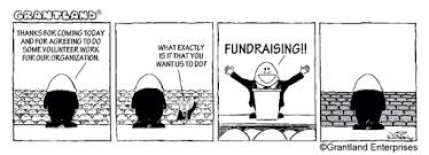
I’ve been waiting to write this blog post for months. I’ve been waiting to make these career decisions for even longer. And today, on the sixth anniversary of this blog, I am ready to share what I’ve been thinking about for so long – my plans for the future.
Over my eleven years of working in fundraising and marketing for nonprofits I have learned so much. I’ve learned about the joys and the challenges of working in nonprofits, that there is always work to be done, and that at the end of the day, the work changes lives.
I’ve also learned to key in on the elements of work that I enjoy and that I’m really good at.
- I have eleven years of experience of working in various roles in development teams, and have a real knack for thinking about efficient operations. I know how to effectively manage direct mail appeals, put together major gifts programs, write and report on grants, put on a gala, or maintain a donor database.
- I love thinking about how teams work and supervising staff. Empowering nonprofit staff to do their best work – while taking care of themselves and their needs – is a real passion of mine.
- I love working in periods of change and transition – I like thinking on my feet and introducing new solutions to problems. And I have a knack for being a calming force during a time of chaos.
- I’d like to work with a greater variety of nonprofits. Ever since I got my Masters in Nonprofit Administration, I’ve been craving the ability to use the breadth of knowledge I received with a wide range of organizations.
- I want more flexibility with my time. I’ve realized that when I work constantly, I get in a zone and more quickly burn out, not doing my best work. I want a better balance so that I can do better work.
I’ve taken a lot of time to think about all of this, and had a bunch of informational interviews with people who have worked in development for a long time, and have landed on my next career move:
I’m looking to move into interim development director work.
I’ll help manage your development team, ensure your daily operations are taken care of and that money is raised, and even evaluate your current development program and make some recommendations. I’ll help during your search, help make a smooth transition to your permanent development director and then leave you to succeed.
With the constant state of turnover that many nonprofits find themselves in with this key position, I hope to fill a real need. Just because you’re between development directors doesn’t mean you have to put additional pressure on your current team or redirect someone else’s time. I can come in and help make sure everything runs smoothly.
My last full time day with my current employer is April 7. After some time off, I’ll be looking for jobs like this. If you hear of anyone who might need something like this, please think of me! I’ll be relying on my community of support – and that certainly includes you – to get me plugged in where I need to me. Many thanks in advance!!
-N.C.








